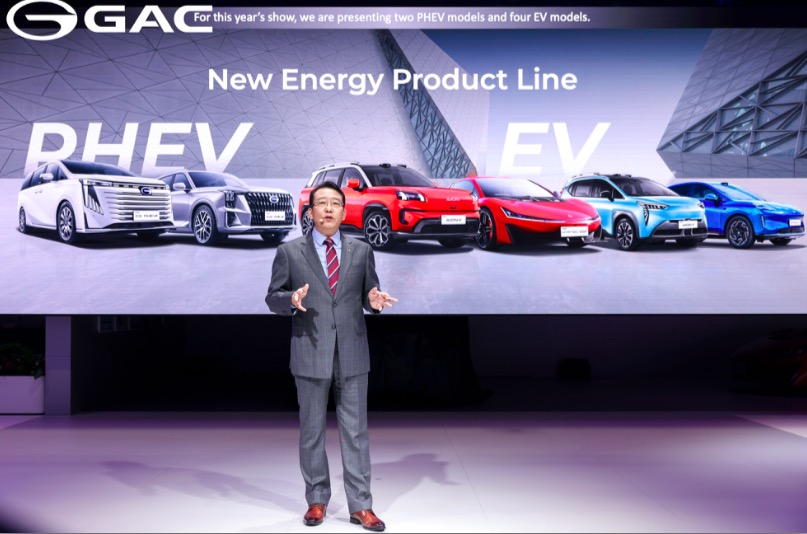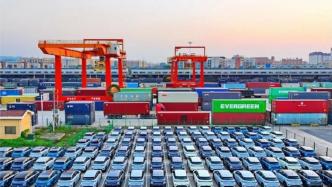
China may impose tariffs of up to 25 percent on imported cars with large-displacement engines as trade tensions escalate with the United States and the European Union.
On the evening of May 21, 2024, the Chinese Chamber of Commerce in the European Union (CCCEU) issued a statement on its official account, saying that it had learned from "insiders" that China might consider raising the temporary tariff rate on imported cars equipped with large-displacement engines.
The statement said the move would have a "significant" impact on European and American automakers, as well as EU relations.
As the deadline for the EU to announce the results of its anti-subsidy investigation on Chinese electric vehicles approaches, China is gradually increasing its counter-sanctions. Consulting firm Eurasia Group believes that the EU must inform Chinese exporters whether it intends to impose tariffs by early June, and the tariffs may take effect one month after the notification.
The European Chamber of Commerce in China referred to an interview published by the Global Times on May 21, in which Liu Bin, chief expert at the China Automotive Technology and Research Center, called for a temporary increase in tariffs on cars with engines larger than 2.5 liters.
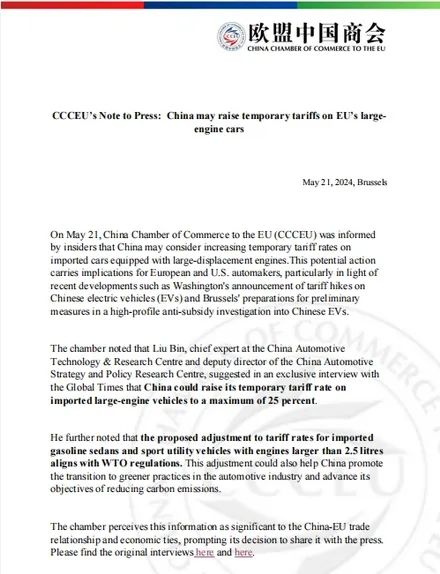
Liu Bin was quoted as saying that China imported 250,000 such vehicles last year, and World Trade Organization rules allow tariffs of up to 25%. The tariff search page of the Chinese Ministry of Commerce shows that there is currently a 15% tariff on passenger cars imported from Europe. The Chinese Ministry of Commerce did not respond to a request for comment.
Daniel Kollar, head of automotive and mobility at consulting firm Intralink, believes the automakers most affected are Toyota Motor, Mercedes-Benz Group and BMW Group. Japanese cars such as Lexus will be affected if China imposes tariffs on imports from all countries, rather than targeting imports from the United States or the European Union.
In addition to auto trade, China may also impose tit-for-tat tariffs on European wine and dairy products and start an investigation into European brandy exports.
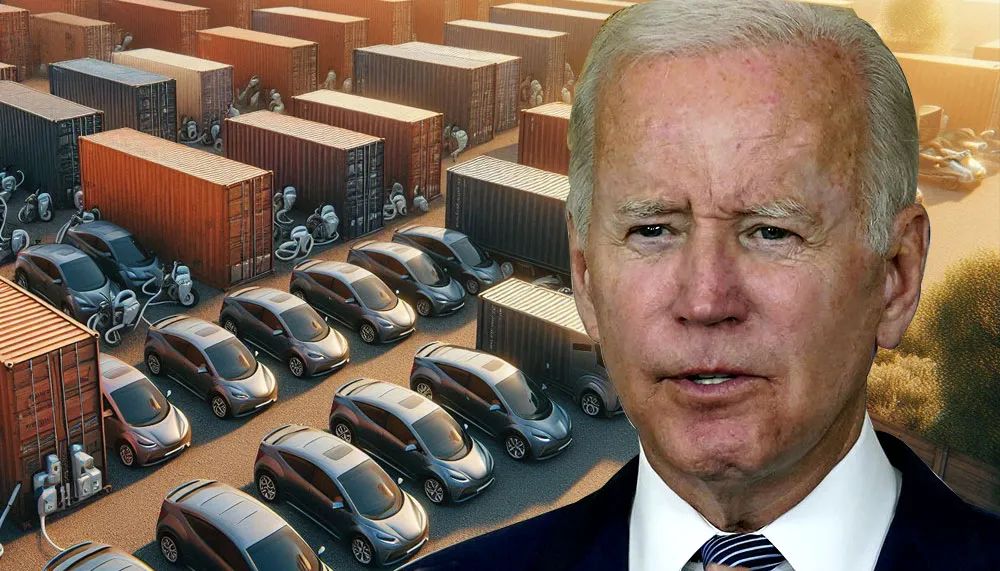
Europe and America are two different worlds
China's auto industry has undergone a revolutionary transformation over the past decade, catapulting the country into a world manufacturing powerhouse, from producing rudimentary Western copies to building cars that rival the world's best.
The electric vehicle industry has come under particular scrutiny amid global concerns about a surge in exports from China, which makes more electric cars than anywhere else and controls much of the battery supply chain. Chinese automakers are looking to expand overseas amid a price war and a slowing economy at home.
Earlier this month, the Biden administration in the United States announced a 100% tariff on Chinese electric vehicles, while the European Union is investigating Chinese subsidies across a number of industries - which has prompted Chinese companies to withdraw from rail and energy tenders.
"Certain countries and regions have adopted restrictive measures in the field of new energy vehicles, which runs counter to the concept of green development. These measures will only harm the interests of their own consumers," Liu Bin told the Global Times.
The bigger problem for Europe is that it has itself publicly pledged the urgent need to reduce carbon emissions in the face of a worsening climate crisis.

According to the 2020 EU Green Deal, the EU needs to gradually stop selling new internal combustion engine vehicles by 2035. Agnes Szunomar, director of the Institute of Global Studies at Corvinus University in Budapest, believes that Europe will not be able to achieve its goals if it cannot continue to benefit from Chinese-made electric vehicle batteries.
“Without electric cars, it will be impossible to achieve (Europe’s) climate targets, and electric cars cannot function without batteries,” Szunomar added.
The EU is the largest importer of Chinese electric vehicles. In 2023, China exported 1.55 million electric vehicles, of which about 40% were sold to Europe. Not only that, it is expected that by 2024, Chinese-made cars will account for a quarter of all European car sales.
This shows that Chinese electric vehicles have a unique market position in Europe. Some analysts believe that this has had a significant impact on some areas of Europe's traditional automobile manufacturing industry and has affected the EU job market.
In contrast, the United States has not yet become a major destination for China's electric vehicle exports.
In 2023, China's direct exports of electric vehicles to the United States will only amount to US$368 million, and the domestic electric vehicle market in the United States is mainly dominated by local brands.
On May 14, the Biden administration nearly quadrupled tariffs on Chinese electric vehicles, which in essence closed the door to imported Chinese cars.

Are tariffs a “trap”?
Electric vehicle tariffs imposed by the Biden administration are unlikely to have a noticeable short-term impact in the United States, but could influence decision-making in Europe.
In 2023, the EU's imports of electric vehicles from China more than doubled in seven months. Chinese electric vehicles have weakened the competitiveness of European cars through lower prices, causing concerns among European manufacturers. At the end of May 2024, at the G7 finance ministers' meeting, the tariff issue is expected to be on the agenda.
At a Reuters event in Munich on May 22, Stellantis Group CEO Carlos Tavares expected a major battle with Chinese competitors in the European electric vehicle market, which would have a significant impact on jobs and production.
Tavares made his toughest comments yet in an interview with Reuters as tensions rise between Beijing, Brussels and Washington over electric vehicle trade.
The European Union is expected to decide next month whether to follow the United States in imposing additional tariffs on Chinese automakers.
Tavares believes that imposing tariffs on Chinese cars imported into Europe and the United States is "a major trap for countries that go down this path" that will make it inevitable for Western automakers to restructure to meet the challenge from lower-cost Chinese manufacturers.
The European Commission will announce a preliminary decision on possible tariffs on imported electric vehicles from China on June 5.

"When you compete with Chinese companies to absorb a 30% cost competitiveness advantage, there will be social consequences. Tariffs will only increase inflation in the area where they are imposed and may affect sales and production," Tavares said. "The Darwin era is not in our discussion, but the fact is that we are in the Darwin era."
He believes that the price war with Asian competitors will be "very difficult". "It will not be easy for dealers, suppliers, OEMs, and as we know, in Europe, everyone is talking about change."
Tavares also outlined the overcapacity problem that the European auto industry is about to face. Chinese automakers are expected to sell 1.5 million vehicles in Europe, equivalent to a 10% market share and the output of up to 10 assembly plants. "Obviously, unless you can beat your competitors, you will have overcapacity."
Stellantis Group announced last week that it will sell its Chinese partner Leapmotor brand electric vehicles outside of China, starting in Europe in September. This means that "we are not simply defending against the offensive of Chinese opponents, but we hope to become part of the Chinese offensive."
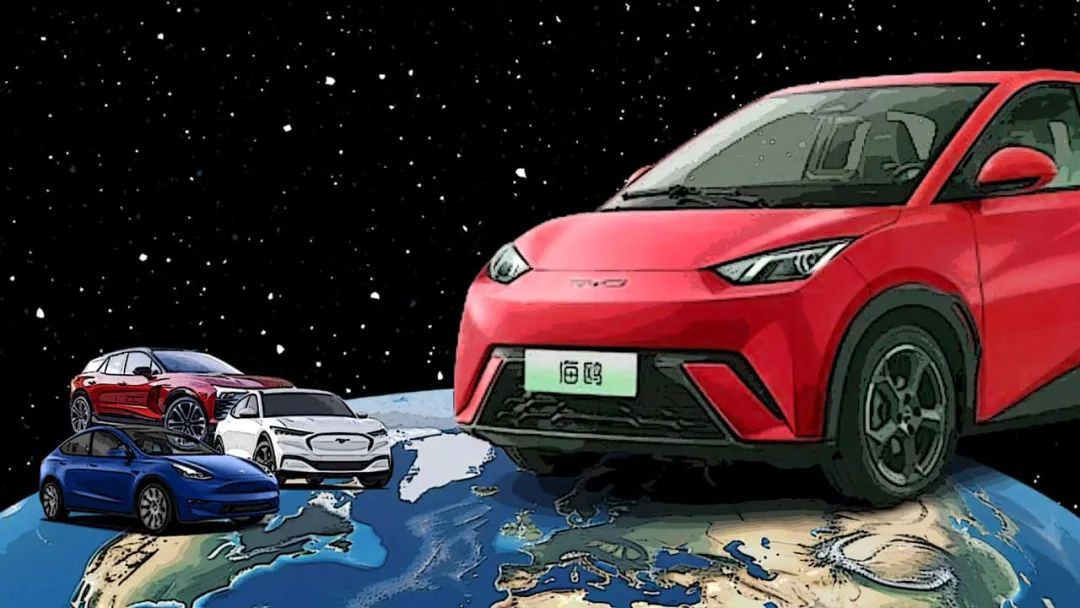
Chinese car companies' European route
The European Commission has launched an investigation into subsidies for electric vehicles, which could lead to the EU imposing higher tariffs on Chinese green technology to protect its own industry.
"Chinese electric car companies are penetrating the EU market," Szunomar said. "The EU knows this and is worried about the consequences, which is why they have already put in place certain restrictions to keep Chinese electric car companies out."
But there are different views. Some industry insiders believe that the investment of Chinese automakers in Turkey, Hungary, Spain, Italy and other countries will not only make it easier for them to enter the European market, but will also protect them from any protectionist measures that the EU may implement.
Below is a look at the European footprint of some Chinese automakers.
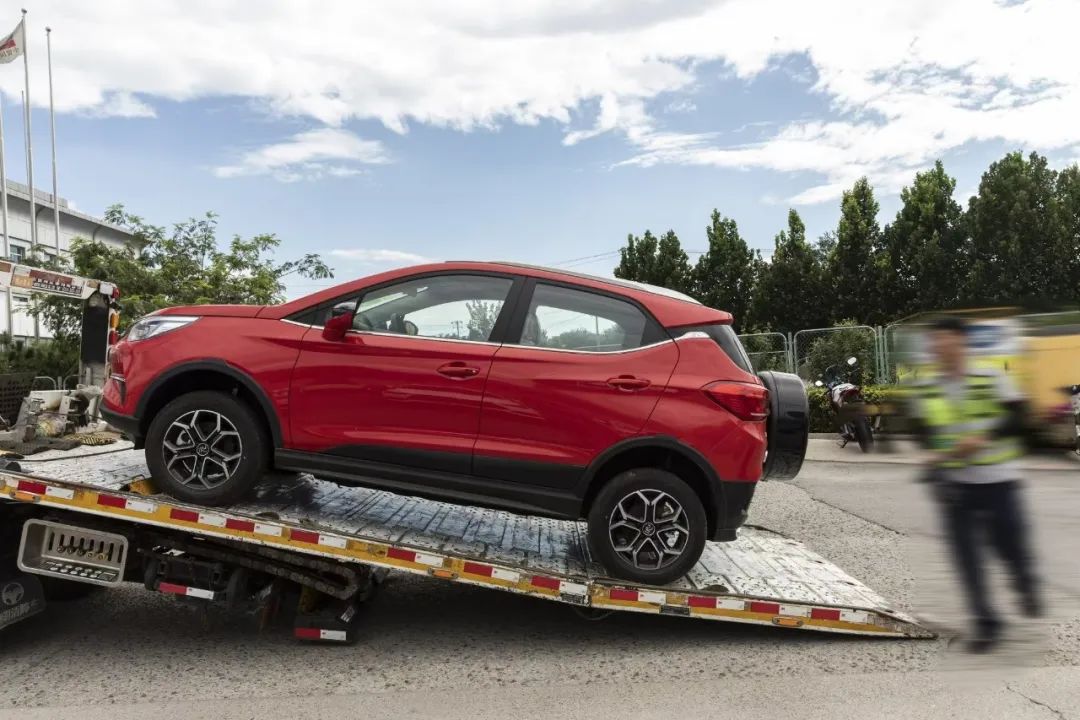
On May 19, Turkish Minister of Industry and Technology Fatih Kacir confirmed that the Turkish government is negotiating not only with BYD and Chery Automobile, but also with SAIC and Great Wall Motors. "We hope to complete the negotiations as soon as possible. We have made great progress in both aspects."
Chinese electric vehicle manufacturers are increasingly turning their attention to Türkiye for four reasons.
First, Turkey has a customs union agreement with the European Union, and building factories in Turkey may be beneficial to Chinese automakers. Pure electric vehicles sell well locally, accounting for 7.5% of all new car sales in 2023, and are expected to jump to about 30.4% by 2032.
BYD Europe Managing Director Michael Su recently said the company is interested in building a second plant in Europe to support the one being built in Hungary. Bloomberg said additional European investment could help Chinese companies avoid potential tariffs after the European Union launched an investigation into alleged state subsidies for Chinese companies.
Second, China has been building strong ties with Turkey, which provides major factories for several European automakers, including Ford Motor and Renault, and opens new frontiers for China to enter Europe.
Third, Chinese companies favor Turkey not only because of its proximity to Europe, its large labor force, and its strong industrial infrastructure, but also because it is a member of the EU Customs Union.
Turkey will provide access to neighboring regions, primarily the Middle East, where many Chinese brands are establishing partnerships. From a geographical perspective, Turkey appears to be becoming a hub, much like Mexico is in North America.
Fourth, Turkey will impose an additional 40% tariff on Chinese-made electric vehicles to protect its only domestic electric vehicle manufacturer, TOGG.
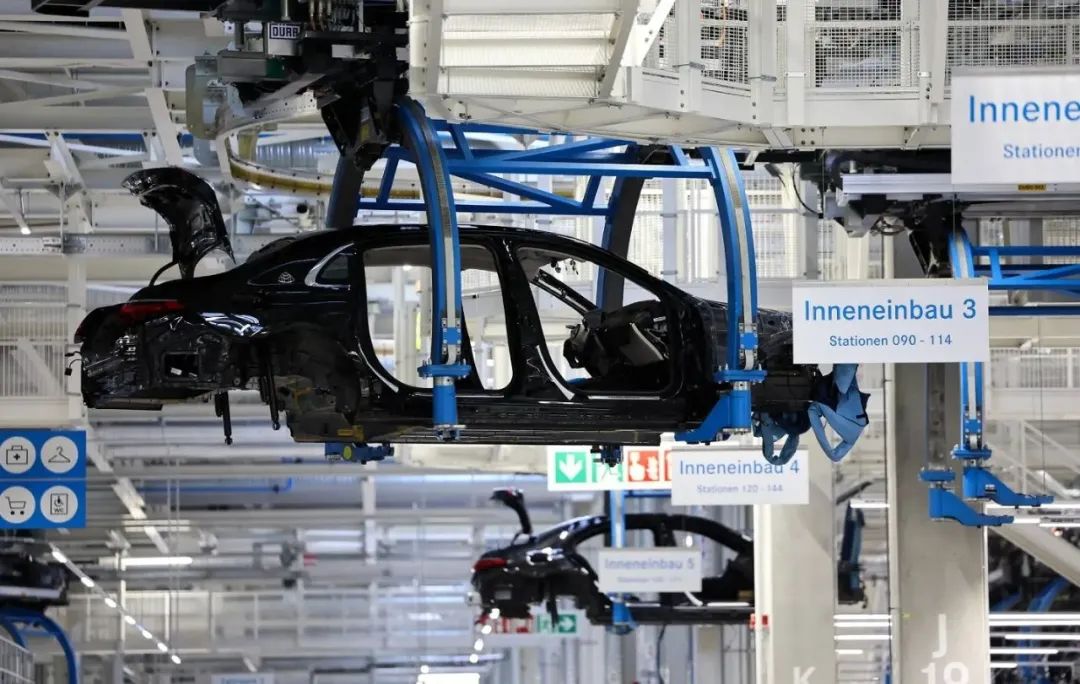
BYD's assembly plant in Hungary will produce about 200,000 vehicles per year. While that's a lot, it's not enough if the company wants to achieve its goal of becoming Europe's leading electric car maker by 2030.
Turkey's electric vehicle sales will increase eightfold year-on-year to nearly 69,000 units in 2023. Turkey offers a new market for both affordable and luxury electric vehicle brands, with BMI Research data showing that by 2025, Turkey's electric vehicle sales will reach 180,000 units.
In Hungary, Chinese automakers are investing hundreds of millions of dollars to build their own European factories.
BYD announced at the end of last year that it would invest 500 million euros to build its first European factory in the southern city of Szeged, covering an area of about 300 hectares. It is the first Chinese automaker to establish a production base in Europe, and its European managing director announced on May 16 that it is considering building a second factory in Europe in 2025.
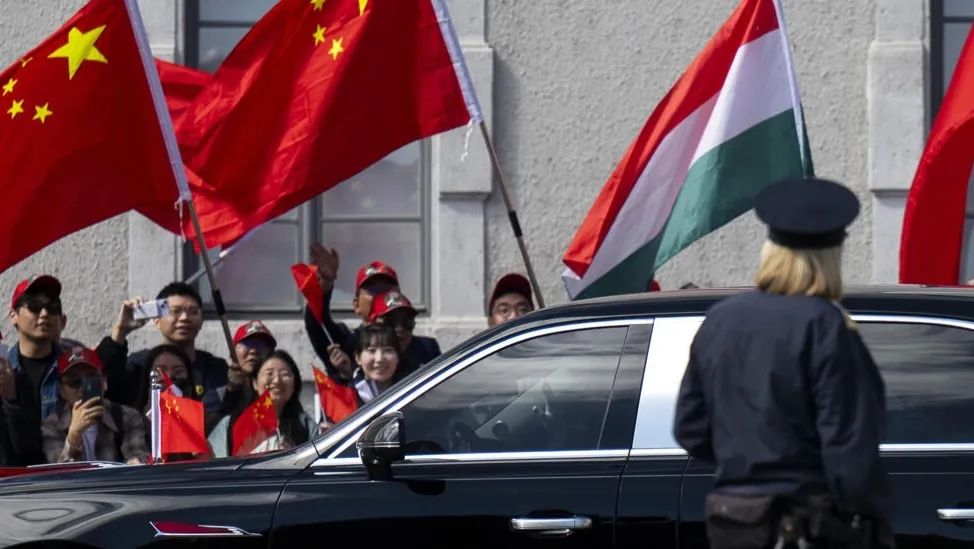
Tamas Gerocs, a researcher and international associate at the State University of New York, believes BYD poses a direct challenge to major European automakers.
“The problem is that BYD has its own battery system and Germany does not, and they control the suppliers or the entire value chain in a more favorable way than Germany. This is serious, it is not just about making batteries, but also about the mining end of the industry chain, that is, the mines. For example, no German company has direct access to lithium supplies - while most Chinese companies can,” warned Gerocs.
Szunomar of Budapest's Corvinus University said that establishing a production center within the European Union would lay the foundation for China to launch high-quality electric vehicles in Western markets.
“Chinese automakers will definitely be competition to European automakers,” she said. “Technologically, they are at the same level, or at a better level, but in terms of price, they are cheaper.”
In Italy, Bloomberg once reported that Dongfeng Motor is considering building a factory there.
Analysts suggest that Dongfeng's factory construction plan reflects the fact that Chinese electric vehicles are playing a leading role in the transformation of the global automotive industry.
Bloomberg quoted the head of Dongfeng Motor's European business as saying that Dongfeng Motor is negotiating with the Italian government to build a factory with an annual production capacity of more than 100,000 vehicles.
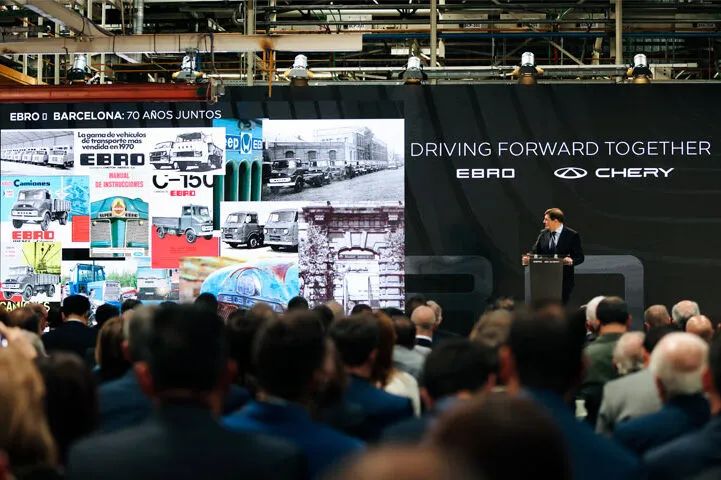
In Spain, Chery Automobile's newly acquired Barcelona plant will become one of its main global export facilities, with the goal of producing 150,000 vehicles per year by 2029.
This is Chery's first plant in Europe and will start production in late summer this year. Chery Automobile and Spanish company EV Motor will initially employ 150 former Nissan Motor workers who are undergoing a training program.
Chery Automobile and EV Motors will invest about 400 million euros ($426.64 million) in the plant, Spain said, as it launches a 5 billion euro plan in 2020 to become Europe's big electric vehicle hub.
This year, Chery Automobile will produce the Omonda 5 in Barcelona, including electric and fuel versions, and will later produce the Jaecoo 7 there.
(Original title: "Chinese Automakers Seek a Way to Europe")

